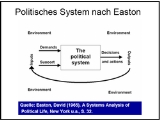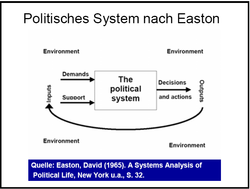
Systems theory in political science
Encyclopedia

Politics
Politics is a process by which groups of people make collective decisions. The term is generally applied to the art or science of running governmental or state affairs, including behavior within civil governments, but also applies to institutions, fields, and special interest groups such as the...
, influenced by cybernetics
Cybernetics
Cybernetics is the interdisciplinary study of the structure of regulatory systems. Cybernetics is closely related to information theory, control theory and systems theory, at least in its first-order form...
. The adaptation of system theory to political science
Political science
Political Science is a social science discipline concerned with the study of the state, government and politics. Aristotle defined it as the study of the state. It deals extensively with the theory and practice of politics, and the analysis of political systems and political behavior...
was first conceived by David Easton
David Easton
David Easton is a Canadian political scientist who was born in Toronto, Ontario, went to the United States in 1943, and is currently Distinguished Research Professor in the Department of Political Science at the University of California, Irvine.He is a former President of the American Political...
in 1953.
Overview
In simple terms, Easton's behavioral approach to politics, proposed that a political system could be seen as a delimited (i.e. all political systems have precise boundaries) and fluid (changing) system of steps in decision making. Greatly simplifying his model:- Step 1. changes in the social or physical environment surrounding a political system produce "demands" and "supports" for action or the status quo directed as "inputs" towards the political system, through political behavior.
- Step 2, these demands and supporting groups stimulate competition in a political system, leading to decisions or "outputs" directed at some aspect of the surrounding social or physical environment.
- Step 3, after a decision or output is made (e.g., a specific policy), it interacts with its environment, and if it produces change in the environment, there are "outcomes."
- Step 4, when a new policy interacts with its environment, outcomes may generate new demands or supports and groups in support or against the policy ("feedback") or a new policy on some related matter.
- Step 5, feedback leads back to Step 1, it's a never ending story.
If the system functions as described, then we have a "stable political system". If the system breaks down, then we have a "dysfunctional political system".
Political analysis
Easton aspired to make politics a science, that is, working with highly abstract models that described the regularities of patterns and processes in political life in general. In his view, the highest level of abstraction could make scientific generalizations about politics possible. In sum, politics should be seen as a whole, not as a collection of different problems to be solved.His main model was driven by an organic view of politics, as if it were a living object. His theory is a statement of what makes political systems adapt and survive. He describes politics in a constant flux, thereby rejecting the idea of "equilibrium", so prevalent in some other political theories (see institutionalism
Institutionalism
Institutionalism can refer to:* Old Institutionalism: An approach to the study of politics that focuses on formal institutions of government* New institutionalism: a social theory that focuses on developing a sociological view of institutions, the way they interact and the effects of institutions...
). Moreover, he rejects the idea that politics could be examined by looking at different levels of analysis. His abstractions could account for any group and demand at any given time. That is, interest group theory and elite theory can be subsumed in political systems analysis.
His theory was and is highly influential in the pluralist tradition
Pluralism (political theory)
Classical pluralism is the view that politics and decision making are located mostly in the framework of government, but that many non-governmental groups use their resources to exert influence. The central question for classical pluralism is how power and influence is distributed in a political...
in political science. (see Harold Lasswell
Harold Lasswell
Harold Dwight Lasswell was a leading American political scientist and communications theorist. He was a member of the Chicago school of sociology and was a professor at Yale University in law. He was a President of the American Political Science Association and World Academy of Art and Science...
and Robert Dahl)

